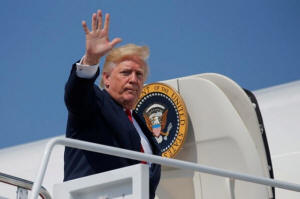|
Trump
administration's Africa policy in focus at AGOA trade talks
 Send a link to a friend
Send a link to a friend
 [August 08, 2017]
By Lesley Wroughton [August 08, 2017]
By Lesley Wroughton
WASHINGTON (Reuters) - With the Trump
administration's trade agenda focused on reining in China and
renegotiating the North American Free Trade agreement, Africa has
barely appeared on the radar screen.
That could change this week as President Donald Trump's top trade
negotiator and other senior U.S. officials head to the West African
nation of Togo to review a Clinton-era free trade pact with
sub-Saharan Africa, in the administration's first high-level
delegation to visit the region.
Looming over the two-day ministerial is China's growing role in
African trade and influence, as Beijing finances massive
infrastructure projects in the region, some through its new Asian
Infrastructure and Investment Bank.
While U.S. exports to sub-Saharan Africa as a whole have doubled to
$21.81 billion from $10.96 billion in 2000, according to U.S.
Commerce Department data, they were dwarfed by China's $102 billion
in exports to the region in 2015.

Also at issue is whether the Trump officials, led by U.S. Trade
Representative Robert Lighthizer, will signal a desire to change the
trade agreement before it expires in 2025. Trump has sought to
bolster his "America First" campaign by withdrawing from the Trans
Pacific Partnership, threatening to rip up NAFTA and seeking to
renegotiate the U.S.-South Korea free trade deal.
Launched in 2000, the African Growth and Opportunity Act (AGOA) has
been barely mentioned by any Trump officials.
But no moves toward an early renewal or extension of AGOA are
expected, said Constance Hamilton, deputy assistant U.S. Trade
Representative for Africa.
Lighthizer will stress the importance to the administration of
deepening its trade relationship with Africa, but will also caution
that African countries should "engage in fair trade, eliminate
barriers to U.S. exports and abide by the eligibility criteria of
the AGOA program," said Hamilton.
The U.S. trade deficit with the 38 AGOA countries shrank to about
$7.9 billion last year from a peak of $64 billion in 2008, as U.S.
shale oil production increases have lessened the need for oil
imports from major exporters Nigeria and Angola.
Overshadowing the talks will be an "out-of-cycle" review of AGOA
trade benefits to Rwanda, Uganda and Tanzania, which have supported
a phased ban on imports of second-hand clothing. U.S. groups say the
move violates AGOA rules.
[to top of second column] |

President Donald Trump boards Air Force One for travel to New Jersey
from Joint Base Andrews, Maryland, U.S. August 4, 2017.
REUTERS/Jonathan Ernst

"The fact that we accepted the petition under the
Trump administration, I won't say that means we're any harder on any
countries, it just says we respect the criteria," said Hamilton, who
emphasized that the issue was still under review by USTR.
The administration has paid little attention to developing a
U.S.-Africa policy, said Kim Elliot, a trade expert at the
Washington-based Center for Global Development.
"This administration has just shown almost zero interest in Africa,"
said Elliot. "It has not been a big focus, there is no sign at all
that it has engaged the president's interest."
Scott Eisner, president of the U.S. Chamber of Commerce's
U.S.-Africa Business Center, said African countries should look at
reforms to attract more foreign investment.
AGOA, in its current form, will likely become irrelevant for a
number of markets by 2025, he said.
"Those governments that want to continue to count on the U.S. market
need to be prepared to come to the table to have bi-lateral or
regional trade talks - whether they are called a free trade
agreement or something different," Eisner said.
Peter Barlerin, a senior State Department official, said African
nations need to start thinking about what comes after AGOA.

"We're not going to see AGOA stretching out to infinity, so
eventually we will move into some other kind of arrangement, and
that could include bilateral or larger free trade agreements with
parts of Africa," he said.
(Reporting by Lesley Wroughton; Editing by Tom Brown) [© 2017 Thomson Reuters. All
rights reserved.]
Copyright 2017 Reuters. All rights
reserved. This material may not be published, broadcast, rewritten
or redistributed. |